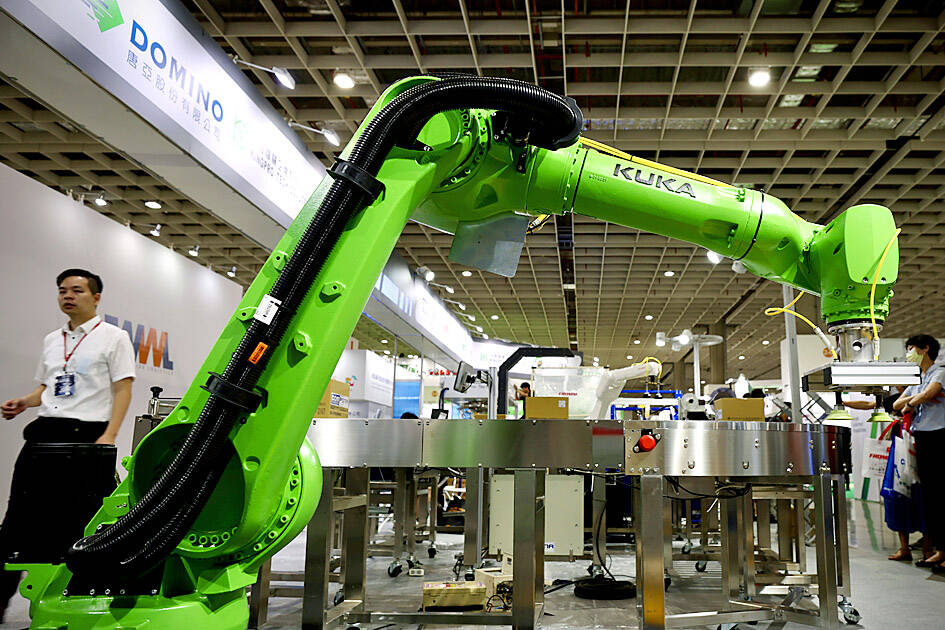The nation’s machinery exports last month fell 3.8 percent year-on-year, dropping for a 17th straight month as the local manufacturers struggled with macroeconomic headwinds and unfavorable foreign exchange rates, the Taiwan Association of Machinery Industry said in a report yesterday.
Machinery exports — comprising inspection and testing of equipment, electronic equipment and machine tools — totaled US$2.62 billion (US$84.14 million) last month, down from US$2.72 billion a year earlier, but up from US$2.49 billion the previous month, data compiled by the association showed.
The annual decrease in machinery exports continued to shrink over the past two months, suggesting a positive growth in overall shipments is around the corner for the industry, the report said.

Photo: Ritchie B. Tongo, EPA-EFE
However, exports of machine tools last month registered negative growth for the 11th consecutive month with an annual decrease of 19.8 percent, an indication that makers of machine tools remained victims of geopolitical tensions, macroeconomic weakness and the sharp depreciation of the Japanese yen, it said.
As global competition for orders becomes increasingly fierce, foreign exchange rates have become a key factor affecting Taiwanese manufacturers’ ability to secure orders, the association said, adding that the government should keep a close eye on the exchange rates of rival nations.
The NT dollar last year depreciated 1.03 percent against the US dollar, while the won declined 4.22 percent, the yuan 3.51 percent and the yen 10.33 percent, it said.
For the whole of last year, machinery exports slid 15.3 percent year-on-year to US$29.47 billion, the report said.
Production value in the machinery industry also decreased 16.5 percent to NT$1.21 trillion from the previous year, it said.
By product, exports of machine tools last year fell 14 percent from a year earlier to US$2.3 billion, overseas shipments of electronic equipment decreased 6.1 percent to US$4.76 billion and those of inspection and testing of equipment dropped 6.1 percent to US$4.61 billion, the report said.
China and the US were the two largest buyers of Taiwanese machinery last year at US$6.93 billion each, equally with a 23.5 percent share of the nation’s total exports, followed by Japan, with purchases totaling US$2.38 billion and accounting for 8.1 percent, it said.
Local machinery makers remain conservative about their business outlook this year as the overall manufacturing industry has not completely come out of the woods and firms are cautious about investing in machinery equipment, the report said.
The association said it would seek support from its Chinese counterpart to persuade Beijing from implementing new trade measures against Taiwan — such as suspending tariff concessions on several products including machinery under the Economic Cooperation Framework Agreement early harvest list — as the deal is mutually beneficial to the machinery industry on both sides of the Taiwan Strait.
Local manufacturers should make more efforts to expand their presence in other markets such as the US, Mexico and the Middle East to diversify their risk, it said.

SETBACK: Apple’s India iPhone push has been disrupted after Foxconn recalled hundreds of Chinese engineers, amid Beijing’s attempts to curb tech transfers Apple Inc assembly partner Hon Hai Precision Industry Co (鴻海精密), also known internationally as Foxconn Technology Group (富士康科技集團), has recalled about 300 Chinese engineers from a factory in India, the latest setback for the iPhone maker’s push to rapidly expand in the country. The extraction of Chinese workers from the factory of Yuzhan Technology (India) Private Ltd, a Hon Hai component unit, in southern Tamil Nadu state, is the second such move in a few months. The company has started flying in Taiwanese engineers to replace staff leaving, people familiar with the matter said, asking not to be named, as the

The prices of gasoline and diesel at domestic fuel stations are to rise NT$0.1 and NT$0.4 per liter this week respectively, after international crude oil prices rose last week, CPC Corp, Taiwan (台灣中油) and Formosa Petrochemical Corp (台塑石化) announced yesterday. Effective today, gasoline prices at CPC and Formosa stations are to rise to NT$27.3, NT$28.8 and NT$30.8 per liter for 92, 95 and 98-octane unleaded gasoline respectively, the companies said in separate statements. The price of premium diesel is to rise to NT$26.2 per liter at CPC stations and NT$26 at Formosa pumps, they said. The announcements came after international crude oil prices

A German company is putting used electric vehicle batteries to new use by stacking them into fridge-size units that homes and businesses can use to store their excess solar and wind energy. This week, the company Voltfang — which means “catching volts” — opened its first industrial site in Aachen, Germany, near the Belgian and Dutch borders. With about 100 staff, Voltfang says it is the biggest facility of its kind in Europe in the budding sector of refurbishing lithium-ion batteries. Its CEO David Oudsandji hopes it would help Europe’s biggest economy ween itself off fossil fuels and increasingly rely on climate-friendly renewables. While

SinoPac Financial Holdings Co (永豐金控) is weighing whether to add a life insurance business to its portfolio, but would tread cautiously after completing three acquisitions in quick succession, president Stanley Chu (朱士廷) said yesterday. “We are carefully considering whether life insurance should play a role in SinoPac’s business map,” Chu told reporters ahead of an earnings conference. “Our priority is to ensure the success of the deals we have already made, even though we are tracking some possible targets.” Local media have reported that Mercuries Life Insurance Co (三商美邦人壽), which is seeking buyers amid financial strains, has invited three financial